The premise of RV camping is about bringing along life’s luxuries with you wherever you go, and for many of us, that includes an internet connection.
RV WiFi is a tricky subject though, and if you feel you truly can’t live without it, you’ve got a bit to learn.
Can you use WiFi in an RV? Yes, it is possible to connect to the internet wirelessly while traveling in your RV, as long as there’s somewhere to do so.
Thankfully, there are now hundreds of millions of WiFi hotspots around the world that give you a chance to connect, and traveling around the US in your RV is no different.
If the thought of leaving home without access to your emails and social media leaves you drenched in sweat, fear no more. this guide can show you what you need to stay online on the road and your options for getting connected.
Contents
Does an RV Need WiFi?
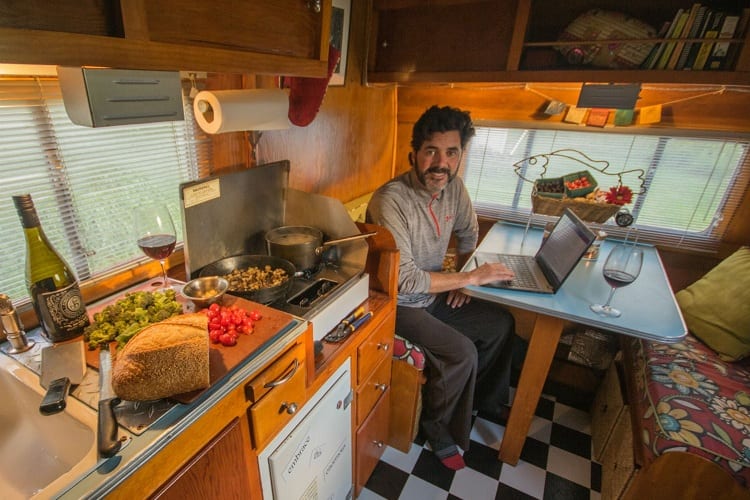
An RV is as unique as the people within it, and while there’s no need to have any form of internet connection while you’re on the road, many people are happier with it.
That being said, it’s never been easier to get wireless in your RV, but what exactly is right for your motorhome depends on a few factors.
- How much money do you want to spend getting internet?
- Do you require a lot of data for things like streaming movies or will it be for the basics?
- How many people in your RV will be relying on this internet connection?
- Do you own your RV or is it just a rental?
- Where are you going on your next trip and what do they offer in terms of wireless connectivity and cellular service?
The Best RV WiFi Options
If you’re someone who needs the internet to travel, it’s never been a better time to travel in an RV.
There are now lots of options for connecting when you leave home, so consider which of these will help you get the WiFi signal of your dreams.
Campground connection
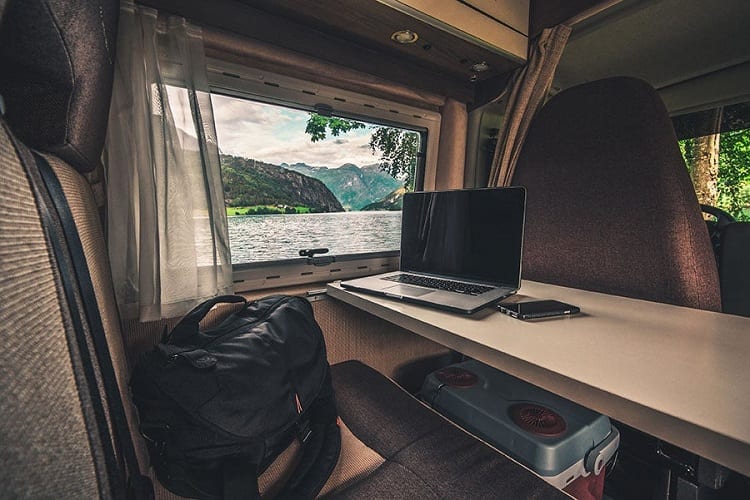
Almost every campground across the US has access to a wireless connection. The problem is, so does everyone else that’s staying there, so you can expect a lot of traffic.
These types of setups are fine for basic internet needs like checking your email, but you probably won’t get much more out of it than that.
Satellite internet
A satellite internet setup can be installed in your RV but requires a full dish to be placed on top, so it only works if you own it and costs more than the other options.
The biggest benefit of satellite internet is that you can connect even when there’s no cell data, and if you never want to be offline, it’s your best bet.
Cellular data
If you have a good data package on your cell plan, you can rely on this to get online.
The issue with cellular data is that you’re limited to the service in that area and with many RV owners liking to travel off the beaten path, you might find that it cuts out sooner rather than later.
Just be sure to purchase the data pack before you head off, as paying
Public hotspots
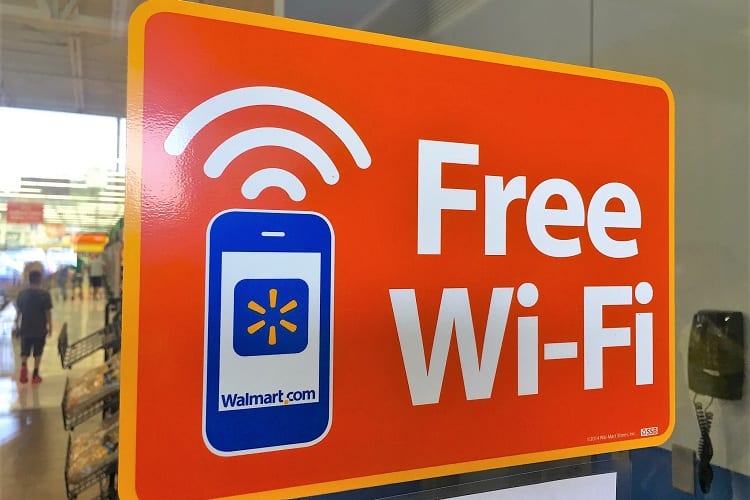
A hotspot is a hub that users can connect to and there are millions of them scattered across the country.
These could be free or have a small fee based on data or time usage, and if you’re located close enough to them it’s easy to connect.
The good news for RV owners is, even if there’s not one near you, you’re bound to come across one on your travels eventually.
Tethering
Tethering is the act of turning your cell phone into a personal hotspot and it might work in areas with good reception.
You can diver the internet connection that comes to your phone to other devices by sharing it with them, and in some cases, it allows for up to five others to join.
Just be careful about chewing up your cell data though, as it can go through a lot with this many people connected.
Staying Safe With RV WiFi

Any time you connect to a public network like those found at hotspots or an RV campground, you’re exposing yourself to additional risks.
Although they might be easy to connect to and are usually free, it’s not the same as using your router at home and doing the things you normally would online.
A public wireless network leaves you vulnerable to attacks from those who can divert the network through their own device which means they can essentially see all of your details.
While you’re on these public connections, you should avoid doing anything that shares sensitive information, like entering passwords, using internet banking, or logging onto a workplace server.
Unfortunately, if you want to stay connected in your RV, you can’t avoid these public networks, but there are a few things you can do to stay safe.
Only enter information on HTTPS or secure websites, have a different password for each account, and consider investing in a VPN service that can hide your IP address from would-be hackers.
Tips For Getting The Best Connection
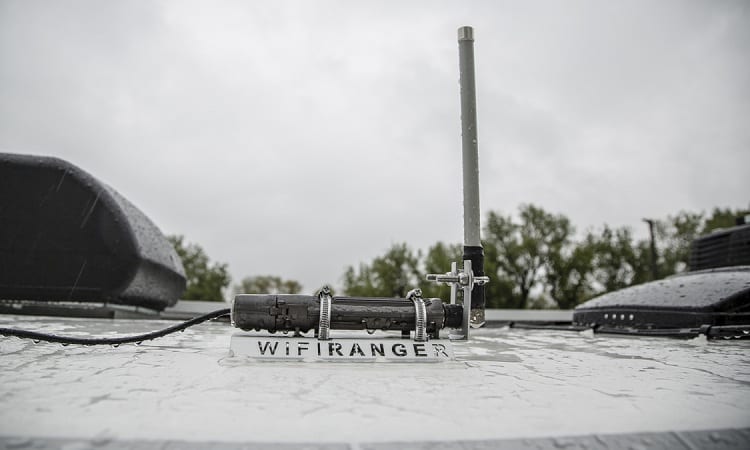
An RV owner always has some tricks up their sleeve to improve any situation, and your internet connection should be no different.
If you’re out on the road or at a campsite and want to make sure you’re making the most of the WiFi, check out these tips:
Invest in a wireless booster or extender
These devices allow you to pick up an internet connection from miles away and improve its strength.
This means you don’t have to drive your RV away from the campsite just to find a reliable network, and if you’re sharing the connection with others, it could help to give yours a boost.
Get a data plan
Before you head off, get yourself a basic data plan with enough to cover your internet needs while you’re on the road.
This can be used as a backup if the campsite internet is slow or your phone runs out, and when it’s prepaid, it usually works out cheaper.
Check the campsites
Most campsites and campgrounds will be able to tell you right away if they have an internet connection, so jump on their website to have a look.
Many people plan their trips solely on whether there’ll be WiFi, so don’t feel like a snob if you want to do the same.
Plan ahead
While traveling in your RV, it’s not likely that you’ll get the same speeds and reliability as you do at home, so don’t come into it expecting the best.
Plan ahead where you can and download some movies whenever you have a good connection so you can save the internet for basic needs like emails.
The Easy Route to RV WiFi
With so much of our lives being lived online these days, more and more people are looking for ways to access the internet even when they’re on the road.
The good news is, there are lots of options for staying connected whether it’s with satellite or free hotspots at campsites, so you’ll always have a way to get online in your RV.
Related Questions
If you want access to the internet even when you’re thousands of miles from home, it’s fairly easy to do from your RV.
To find out more about what’s needed to get online and how you can equip your motorhome with the goods to make it happen, read on to see some FAQs about it.
Can You Get WiFi Internet on the Road?
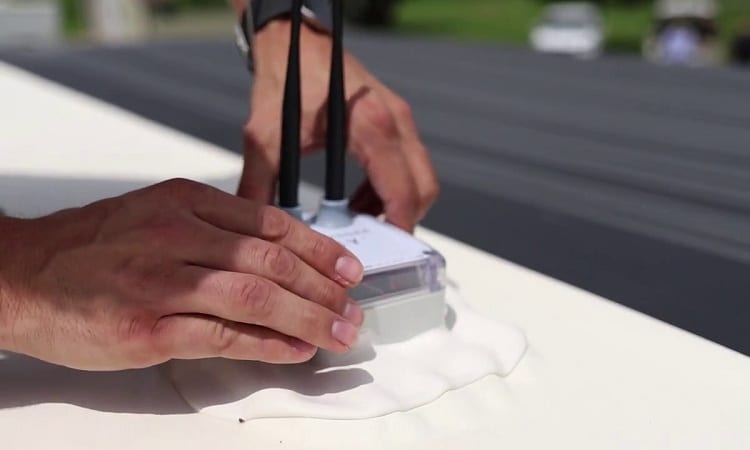
It is possible to get access to the internet even while driving in your RV, and this is usually done with a cellular data plan.
However, when the cell service is no longer in range or you’re traveling somewhere with limited connectivity, having a backup satellite plan can help you stay connected.
Do RV WiFi Boosters Work?
A WiFi booster will only work with an existing internet connection so your RV must have access to one first.
These boosters amplify the wireless signal and improve its speed, so they can be a handy device to keep in your motorhome.
Can You Get High-Speed Internet in an RV?
The best way to access high speed internet for things like watching movies and videos is to use a cellular plan that has adequate data and good reception, or use satellite internet for connectivity when there’s no service.
The speeds of these connections might not be high enough to rival home but should still allow for streaming services and other high data consumers to work.
Resources:


